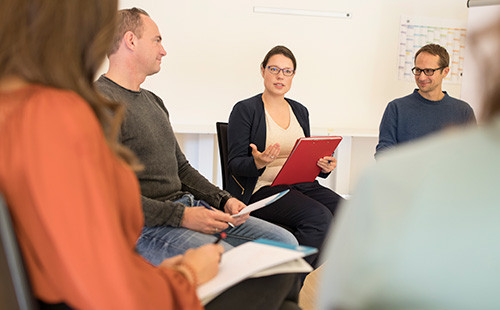Michaela Neumayr

Die Ungleichheit steigt - sinkt…
Doing good, meeting new people, broadening your horizons: there are many reasons for getting involved with a nonprofit organization. And that’s why around one in three Austrians do voluntary work – whether it’s with the volunteer fire department, in the Scout Movement, or in a soup kitchen.
But how do attitudes towards volunteering change in times of growing economic inequality? This question is at the heart of Michaela Neumayr’s research. Neumayr is an associate professor at WU’s Institute for Nonprofit Management and Governance, and she has investigated how the widening gap between rich and poor affects people’s willingness to donate to or volunteer for nonprofit organizations.
In her research, Michaela Neumayr has identified two different mechanisms that influence volunteering and donations – with opposite effects: if, on the one hand, people are confronted with more visible poverty in their environments, this can motivate them to volunteer to do something about the poverty they are witnessing. On the other hand, growing inequality also results in a reduced sense of belonging in society – which, in turn, makes people less likely to volunteer or donate.
How these two mechanisms interact is still an open question. In the latest episode of Meet Our Researchers, Michaela Neumayr explains where she currently stands with her research – and what her findings mean for our society. After filming, we visited her in her office and asked her a few additional questions – about volunteer work, the sense of belonging within a society, and her favorite place on Campus WU.
Wie diese beiden Mechanismen zusammenspielen, ist derzeit noch eine offene Frage. In der neuesten Episode von „Meet Our Researchers“ beschreibt Michaela Neumayr den aktuellen Stand ihrer Forschung und was er für unsere Gesellschaft bedeutet. Nach den Dreharbeiten haben wir sie in ihrem Büro besucht und ihr noch ein paar zusätzliche Fragen gestellt – über freiwilliges Engagement, das sinkende Zusammengehörigkeitsgefühl in unserer Gesellschaft und ihren Lieblingsort am Campus WU.
![[Translate to English:] Portrait von Michaela Neumayr im Gebäude TC](/fileadmin/wu/_processed_/b/2/csm_michaela_neumayr1_7c6acaae3c.jpg)
Michaela Neumayr is an associate professor at the WU Institute for Nonprofit Management and Governance. Her research focuses on civic engagement and the role of nonprofit organizations in the provision of social services, such as childcare. Michaela Neumayr holds a doctorate in economics and previously studied economics and business education at WU Vienna.
Your research focuses on donations and volunteering. What is it that fascinates you about these topics?
My original background is in economics, specifically in social policy. And I’ve always been intrigued by the question of how social services are provided in a society – not only the fact that these services are provided at all, but also at what quality levels, to what extent they meet people’s needs, and whether people actually use them. These services can be provided by different organizations, including NPOs. And then the next question is: How are these services funded? Should they be financed from tax money or from voluntary donations?
How does that make a difference?
It makes a big difference to the organizations that provide the services. The source of the funding determines how freely they can use their money and how far ahead they can plan. In what areas do we see the political will to fund social services – and where not? This is also a key aspect in this connection, and it makes a big difference for the people who use these services.
In the video, you discuss the widening income gap and how it affects people’s willingness to donate or get involved in an NPO. What does this development mean for our society?
Whenever we see solidarity erode in a society in the wake of growing inequality, I think that’s a disastrous development. It means that the feeling of togetherness is dwindling, and people are less and less familiar with the life realities of others, and also less sympathetic.
What can we as individuals do to counteract this trend?
It’s always good idea to step out of your own personal bubble and get in touch with people who lead completely different, less privileged lives. One way of doing this, for example, is to do voluntary work. As a volunteer, you get to work with people you wouldn’t otherwise meet in your everyday life or within your own circle of friends.
How long have you been at WU? What do you like about WU as a workplace?
I’ve been working here for almost 19 years now – I started in 2006, which means that I started out at WU’s old location. I knew the old campus inside out. That was a world of difference compared to the great campus we have here today, with these perfect facilities. I really appreciate working here – because of the technical support and infrastructure alone.
Do you have a favorite place on or around campus?
My favorite building is the “rusty” building, the Teaching Center. It strikes a perfect balance between architectural appeal and functional design. The interior spaces are designed to facilitate communication. This is also true for the classrooms, because they are very wide but only a few table rows deep. There is daylight everywhere, and I really enjoy teaching in these halls. You can tell that it’s a building designed for the people who use it.
![[Translate to English:] Michaela Neumayr vor Gebäude TC](/fileadmin/wu/_processed_/c/9/csm_michaela_neumayr2_72e2ff45c3.jpg)
Michaela Neumayr standing in front of the Teaching Center: “It strikes a perfect balance between architectural appeal and functional design.”
